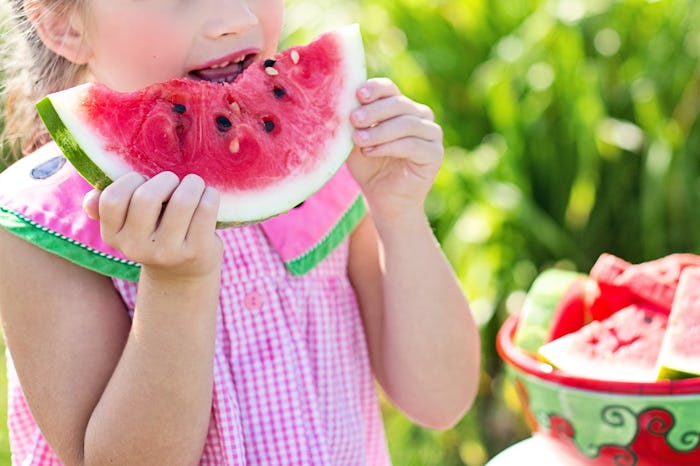As a kid, I made my dinnertime rules pretty clear: I would eat plain, white rice, Pringles, or fried potatoes, or I would not eat at all. My mother, a health food freak by nature, would sit across the table from me and will me to eat my greens, silently wondering what she was doing wrong, while I sat unmoved before my healthy dinner plate, stubborn and stoic. Luckily for my mom, however, new research has uncovered the cause of picky eating, and it turns out parenting has nothing to do with it. Instead, it seems picky eating is genetic.
In a new study published in The Journal of Child Psychology and Psychiatry, scientists found "a significant genetic influence" on both fussy eating and kids' refusal to try new foods. (Unfortunately for parents, researchers also found that fussy eating and refusing to try new foods often go hand in hand.) The findings came about after scientists studied more than 1,900 pairs of 16-month-old twins and their various eating habits. By comparing and contrasting identical and non-identical twins (who share either 100 percent or 50 percent of their genes, respectively), the researchers were able to determine the role of genetics when it came to the toddlers' eating habits.
According to Andrea Smith, a University College London graduate student who co-led the study, it's key for parents to keep mealtimes positive in order to work through fussy eating. "When mealtimes tend to be negative it makes the child tense and those fussy tendencies become stronger," Smith told CNN. "Coercing them into eating also exacerbates these tendencies."
(In other words, my mom's method of trying to win me over with her vinegar-doused spinach concoction probably didn't help her cause. I'm sure Smith would back me up on this one.)
To keep mealtimes positive, it's important that parents offer their kids a wide variety of nutritious food — without making too big a deal about whether or not their fussy eaters consume all of it. If toddlers see the rest of the family eating and enjoying their food, they will usually come around, although it may take some time and patience. "As long as the diet the child has consists of things that have enough nutrients, even it it's quite a narrow diet, then that's not harmful. Fiber and iron are important," Alastair Sutcliffe, a pediatric specialist at University College London, told CNN.
So if your wee one is still turning his or her nose up at kale, be patient — and don't beat yourself up over their picky eating, since it may just be part of their DNA. With some positive encouragement and a variety of healthy options at mealtimes, most kids will grow out of their picky eating. (My advice, though? Perhaps stay away from the vinegar and spinach combo as you try and ease your child into eating their greens. From personal experience, I can promise it doesn't work.)
